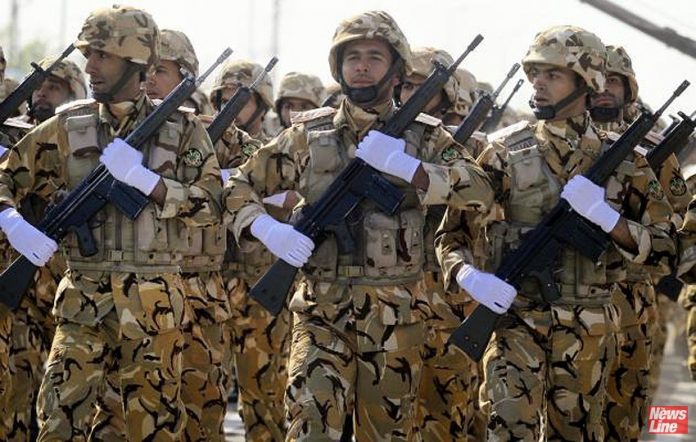IN A HISTORIC meeting, Iranian President Hassan Rouhani has held talks with Iraq’s top Shia cleric Grand Ayatollah Ali al-Sistani in the Iraqi holy city of Najaf on the final day of his landmark visit to the neighbouring Arab state.
Rouhani sat down with Ayatollah Sistani at his residence on Wednesday 13th March after visiting the shrine of Imam Ali (PBUH) – the first Imam of Shia Muslims.
During the meeting, the Iranian president briefed Ayatollah Sistani on his meetings with Iraqi officials as well as agreements about further promotion of ties.
Meanwhile, Ayatollah Sistani welcomed any effort aimed at improving Iraq’s ties with its neighbours based on mutual interests, non-interference and respect for national sovereignty.
He also hailed the great sacrifices made by the Iraqis in the fight against Daesh and praised the role of Iraq’s friends in defeating the terrorist group.
Ayatollah Sistani said fighting corruption and promoting public services were now the major challenges facing Iraq.
Rouhani is the first Iranian president ever to have met with Ayatollah Sistani.
Foreign Minister Mohammad Javad Zarif and Ambassador to Baghdad Iraj Masjedi were also present at the meeting.
Grand Ayatollah Sistani is known as the spiritual leader of Iraqi Shia Muslims and one of the most senior clerics in Shia Islam.
His fatwas have significantly contributed to shaping Iraq’s political structure.
In June 2014 – when the Daesh group unleashed its campaign of terror and destruction in Iraq – Grand Ayatollah Sistani called on his followers to rush to the national army’s help in the fight against the terrorist outfit.
The fatwa helped bring together Shia fighters, Sunni tribesmen as well as Christian and Izadi volunteers under the umbrella of the Popular Mobilisation Units (PMU), commonly known as Hashd al-Sha’abi, to reverse Daesh’s gains and ultimately end the terror group’s territorial rule in Iraq in late 2017.
Later on Wednesday, the Iranian president met with other senior officials and clerics in Najaf.
In a joint statement, Tehran and Baghdad praised Iranian President Hassan Rouhani’s historic visit to Iraq as a ‘turning point’ in efforts to strengthen ‘strategic’ relations between the two nations.
Rouhani visited the shrines of Imam Hussein (PBUH), the third Shia Imam, and his half-brother Abbas ibn Ali, in the holy city of Karbala on Tuesday 12th March.
Heading a high-ranking delegation, Rouhani began his official Iraq visit on Monday, which featured several meetings and the signing of memorandums of understanding for the expansion of bilateral ties in various fields.
In a joint statement, the two neighbouring states hailed Rouhani’s Iraq visit as a ‘turning point’ in efforts to strengthen ‘strategic’ cooperation based on non-interference in each other’s internal affairs.
- The secretary of Iran’s Supreme National Security Council (SNSC) has warned about ‘suspicious nuclear projects’ pursued by certain regional countries as well as efforts aimed at undermining the security of the Islamic Republic and the region.
‘Some countries in the region are spending petrodollars on suspicious nuclear projects … which can pose a more serious danger and crisis than the threat of Takfiri terrorists and Daesh to the region and even the world,’ Ali Shamkhani said on Wednesday.
He noted that the emergence of such new threats would prompt Iran to re-devise its defence strategy based on the nature and geography of the threats so that it would be able to meet the needs of the country and the Armed Forces.
‘We constantly watch all activities of foreigners and certain evil countries of the West Asia region, especially certain unusual activities of some regional countries that have a proven black record of supporting terrorist movements,’ he added.
Shamkhani was apparently pointing to reports that the administration of US President Donald Trump was seeking to advance the sale of nuclear power technology to Saudi Arabia.
A congressional report reveals that the United States is ‘rushing’ to transfer ‘highly sensitive nuclear technology’ to Saudi Arabia.
In February, a congressional committee revealed in a report that the Trump administration was trying to bypass the US Congress to transfer sensitive nuclear power technology to Saudi Arabia.
The House of Representatives’ Oversight Committee, which compiled the report, said it was now ‘launching an investigation to determine whether the actions being pursued by the Trump Administration are in the national security interests of the United States or, rather, serve those who stand to gain financially as a result of this potential change in US foreign policy’.
‘The Trump Administration’s interactions with Saudi Arabia have been shrouded in secrecy, raising significant questions about the nature of the relationship,’ the 24-page report said.
US Energy Secretary Rick Perry said at a conference on Tuesday that talks with Saudi Arabia about the deal were making progress.
‘We’re still making progress, we’re still talking,’ Perry said. ‘Our intent is for them to be our partner as they build their nuclear energy.’
Iran’s foreign minister called the United States’ planned sale of nuclear technology to Saudi Arabia a hypocritical move.
The Trump administration’s move towards a nuclear deal with Saudi Arabia comes as the US president unilaterally withdrew Washington from a landmark nuclear deal between Iran and six world powers in May 2018 despite international criticism and numerous reports by the UN nuclear agency verifying Tehran’s compliance with its obligations under the deal, which was endorsed by UN Security Council Resolution 2231.
